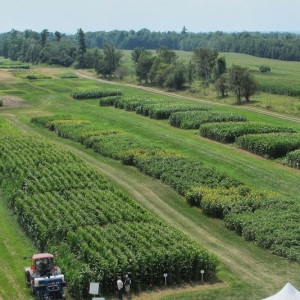Eat It, Drink It, Feed It, Fuel It:
By: Debra Heleba, University of Vermont Extension agriculture coordinator
 Since 2003, the University of Vermont Extension Northwest Crops and Soils program (NWCS) has been conducting on-farm research on a wide range of crops-from cereal grains and forages to hops and oilseeds-to provide farmers and end-users with agronomic information that supports human food and beverage markets, as well as local livestock feed and biofuel production.
Since 2003, the University of Vermont Extension Northwest Crops and Soils program (NWCS) has been conducting on-farm research on a wide range of crops-from cereal grains and forages to hops and oilseeds-to provide farmers and end-users with agronomic information that supports human food and beverage markets, as well as local livestock feed and biofuel production.
Dr. Heather Darby, Extension Agronomic and Soils Specialist, leads NWCS. As a farmer herself, she understands the importance of conducting research locally. “One of the most important reasons for conducting research at a land grant university is to answer the questions that are coming from the community around you,” states Darby. To that end, NWCS brings together farmers and end-users of their products (bakers and brewers, for example) in every step of the research process, from identifying production barriers and developing research questions to implementing trials and sharing the results on-farm. This team approach has allowed NWCS to successfully address goals outlined in Vermont’s Farm to Plate Strategic Plan. Here are just a few examples:
• Toward Vermont’s Farm to Plate goal to increase the overall amount of food produced in Vermont, NWCS conducts variety trials of wheat, barley, and hops. It also created a grains and hops testing lab to ensure high quality, safe local products. Several bakeries are now using Vermont-grown wheat and nine Vermont breweries are using locally grown hops.
• NWCS research on cover crops and home-grown livestock forages as well as its nutrient management planning education have helped dairy farmers reduce off-farm fertilizer and livestock feed purchases moving toward Vermont’s goal to decrease adverse environmental impacts from farming and food system activities and the goal to increase dairy farm viability. Results from a 2010 NWCS survey suggest that through the development of nutrient management plans, Vermont dairy farms have reduced phosphorus additions on their farms by an average of 50% and have implemented cover cropping and other conservation practices.
• Toward the Farm to Plate goal to increase food system renewable energy sources, NWCS research and outreach projects in partnership with the Vermont Bioenergy Initiative on sunflower, soybean and canola crops have sought to build on-farm energy independence; more than 24 farms are now growing their own oilseed crops for fuel, feed, and fertilizers.
To learn more about NWCS and its research to date, visit www.uvm.edu/extension/cropsoil.





